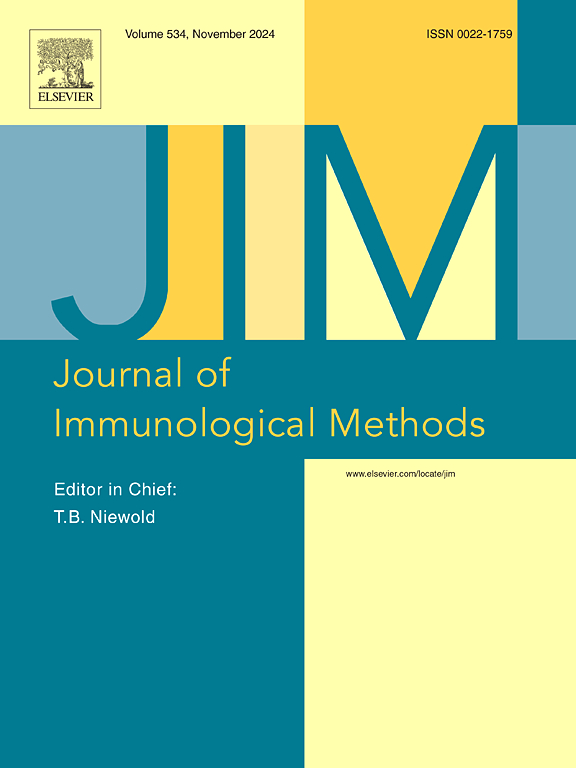使用同源抗非典型免疫测定法测定贝利木单抗浓度。
IF 1.6
4区 医学
Q4 BIOCHEMICAL RESEARCH METHODS
引用次数: 0
摘要
监测患者体内的贝利木单抗浓度是评估治疗反应和个性化药物剂量的重要工具。测量治疗性单克隆抗体的浓度可采用多种检测方法。一种特别有用的方法是使用抗非典型单克隆抗体,这种抗体对相关抗体具有高度特异性。在这里,我们将介绍一种针对贝利木单抗的特异性高亲和力抗原抗体的开发过程,以及在同源夹心酶联免疫吸附试验中应用该抗体测量贝利木单抗浓度的情况。本文章由计算机程序翻译,如有差异,请以英文原文为准。
Belimumab concentration measurements using a homologous anti-idiotype immunoassay
Monitoring belimumab concentrations in patients can be a valuable tool for assessing treatment response and for personalizing drug doses. Various assay formats may be used to measure concentrations of therapeutic monoclonal antibodies. A particularly useful format involves the use of anti-idiotype monoclonal antibodies, selected to be highly specific to the antibody of interest. Here, we describe the development of a specific, high-affinity anti-idiotype antibody to belimumab, and the application of this antibody in a homologous sandwich ELISA to measure belimumab concentrations.
求助全文
通过发布文献求助,成功后即可免费获取论文全文。
去求助
来源期刊
CiteScore
4.10
自引率
0.00%
发文量
120
审稿时长
3 months
期刊介绍:
The Journal of Immunological Methods is devoted to covering techniques for: (1) Quantitating and detecting antibodies and/or antigens. (2) Purifying immunoglobulins, lymphokines and other molecules of the immune system. (3) Isolating antigens and other substances important in immunological processes. (4) Labelling antigens and antibodies. (5) Localizing antigens and/or antibodies in tissues and cells. (6) Detecting, and fractionating immunocompetent cells. (7) Assaying for cellular immunity. (8) Documenting cell-cell interactions. (9) Initiating immunity and unresponsiveness. (10) Transplanting tissues. (11) Studying items closely related to immunity such as complement, reticuloendothelial system and others. (12) Molecular techniques for studying immune cells and their receptors. (13) Imaging of the immune system. (14) Methods for production or their fragments in eukaryotic and prokaryotic cells.
In addition the journal will publish articles on novel methods for analysing the organization, structure and expression of genes for immunologically important molecules such as immunoglobulins, T cell receptors and accessory molecules involved in antigen recognition, processing and presentation. Submitted full length manuscripts should describe new methods of broad applicability to immunology and not simply the application of an established method to a particular substance - although papers describing such applications may be considered for publication as a short Technical Note. Review articles will also be published by the Journal of Immunological Methods. In general these manuscripts are by solicitation however anyone interested in submitting a review can contact the Reviews Editor and provide an outline of the proposed review.

 求助内容:
求助内容: 应助结果提醒方式:
应助结果提醒方式:


